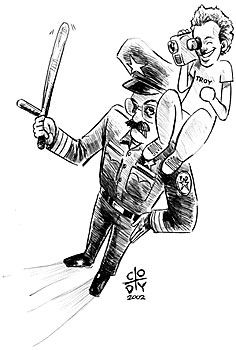
Illustration by Codey Angell
|
By Jason Winsky
Arizona Daily Wildcat
September 13, 2002
You can find more than just police officers patrolling the streets of many cities these days, including Phoenix. Groups of citizen volunteers have taken it upon themselves to start organizations called Copwatch, whose goal is to eliminate police brutality by videotaping officers performing routine duties.
According to Phoenix's Copwatch Web site, the organization is "a citizens group formed to combat abuse by the police in our community. We use a variety of means to fight abuse by the police including community patrols, videotaping, community education and protests. We do this because we believe that police brutality is widespread in our communities and that the only way to stop it is to confront it directly."
The Phoenix organization, however, has not caught any instance of police brutality in two years of operation, which can mean basically one of two things: Either Copwatch in Phoenix is just that good or the "widespread" police brutality claimed by Copwatch simply doesn't exist.
The members of Copwatch are nevertheless determined. The founder of Copwatch in Phoenix is Joel Olson, an individual who brings new meaning to the term radical. According to Olsen, paraphrased in a New Times article, "Copwatch holds that police are the foot soldiers in a class system based on race. Copwatch believes a subtext of all police work is to ensure that a city's black neighborhoods stay black and white neighborhoods stay white."
Fundamentally the guiding principles of Copwatch seem correct. It is, after all, our job as citizens to make sure that public servants behave appropriately. But there are several procedures already in place to handle issues that arise in police activity, such as Internal Affairs divisions in police departments and civilian review boards. It could easily be said that if one looks hard enough for anything (such as police brutality), they will find it.
It would seem from the Copwatch literature that we are to believe they are neutral observers only there to monitor police activity. But it's obvious that the members of Copwatch already have a forgone conclusion that the police are largely corrupt.
The fact that Copwatch members videotape police activity brings an interesting angle to the issue. Most people realize that being a police officer is a dangerous job. But what most people probably don't take the time to consider is exactly what law enforcement officials have to deal with on a daily basis. Just to toss out a few figures. According to the FBI, last year 69 police officers were killed and over 56,000 were assaulted. It's probably more likely for Copwatch to catch a person assaulting a police officer than the other way around.
This presents an interesting dilemma. Imagine this hypothetical: Organization members arrive at a scene of a police officer writing a traffic ticket. During the course of events, the officer is violently assaulted while Copwatch cameras roll. Would the members of Copwatch be forthcoming with this tape and their accounts of what happened? The answer is unclear. The police, after all, are "foot soldiers of a class system based on race." Maybe the officer "deserved" to be assaulted. Maybe Copwatch members will go home and erase the tape.
There is also the fundamental question as to whether the presence of these observers can also serve as a distracting ÷ and therefore dangerous ÷ influence on law enforcement officials during an emergency. Tempe Police Sergeant David Lind was quoted in the New Times as saying, "If they (Copwatch) have a question about what we do I would hope they don't step in while we are doing what we are doing. If they want to address the situation, that's fine, they just have to choose the right time to address it. There are laws allowing an officer to do his or her job safely."
An interesting note is that Copwatch was created following police brutality events that were caught on tape such as the beating of Rodney King. But people in the past who have randomly filmed police actions have a credibility that cannot be affored to Copwatch: People filming incidents like Rodney King were just at the right place at the right time, with no preconceived notions of the police and no agenda to serve. Copwatch does not have that credibility.
Copwatch needs to establish credibility and an assurance to the public that they will not interfere with police officers attempting to do their jobs. Until that time, we cannot trust Copwatch to deliver unbiased information to the public about police actions.

